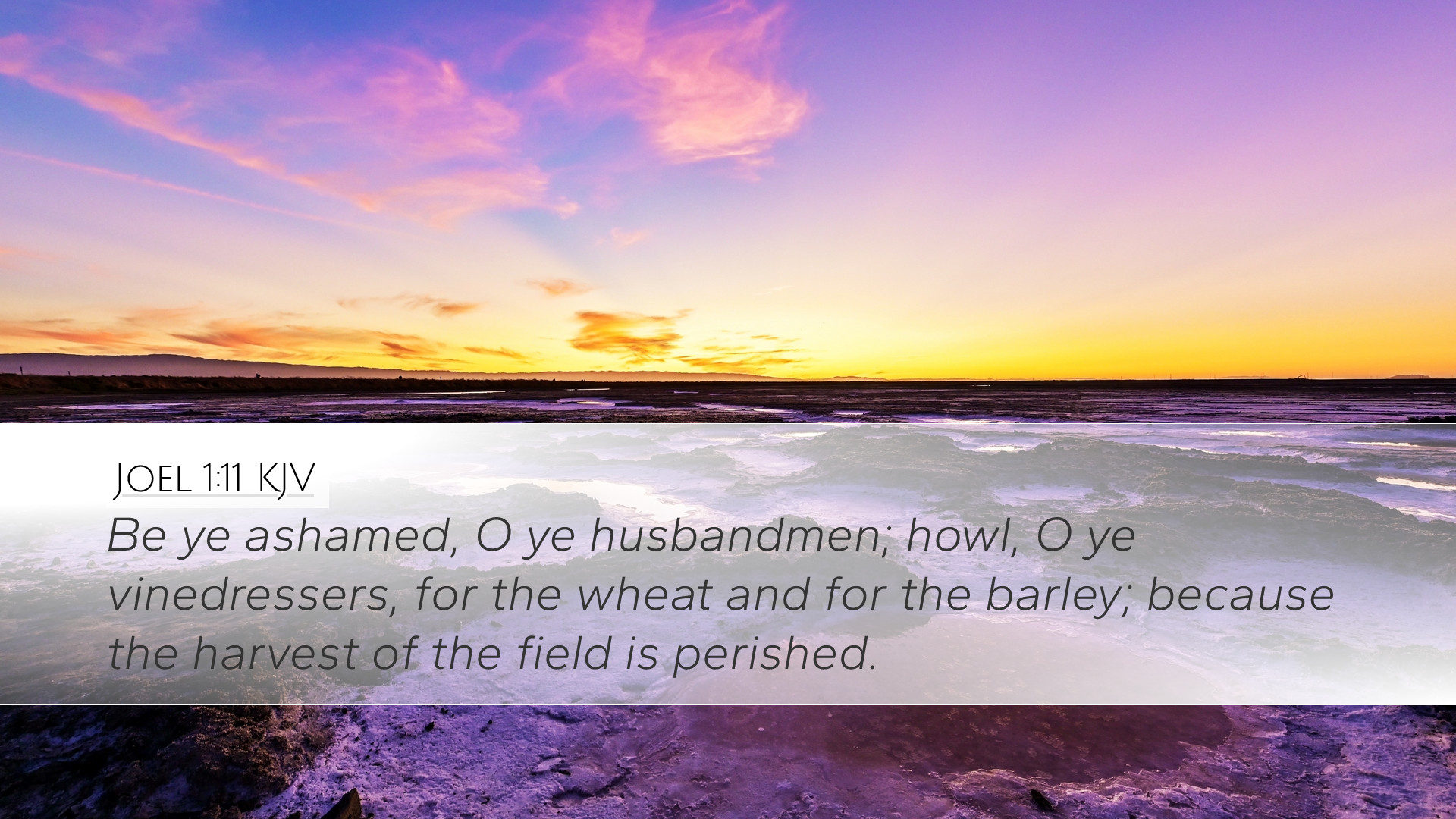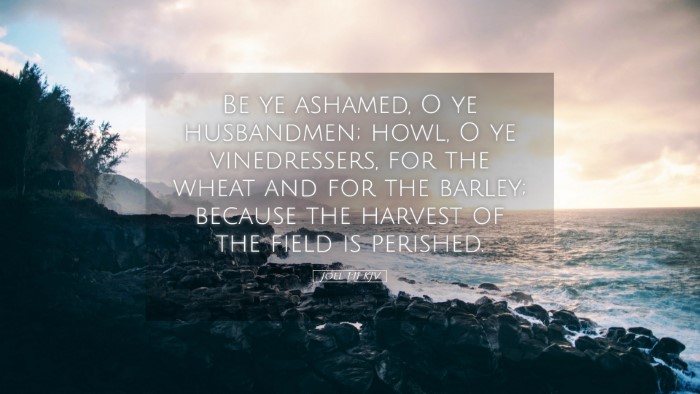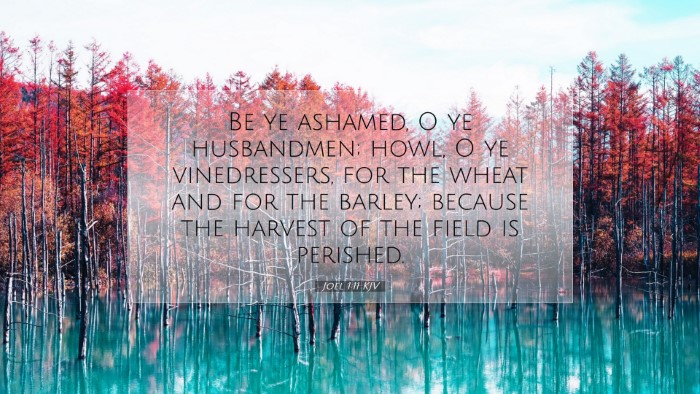Old Testament
Genesis Exodus Leviticus Numbers Deuteronomy Joshua Judges Ruth 1 Samuel 2 Samuel 1 Kings 2 Kings 1 Chronicles 2 Chronicles Ezra Nehemiah Esther Job Psalms Proverbs Ecclesiastes Song of Solomon Isaiah Jeremiah Lamentations Ezekiel Daniel Hosea Joel Amos Obadiah Jonah Micah Nahum Habakkuk Zephaniah Haggai Zechariah MalachiJoel 1:11
Joel 1:11 KJV
Be ye ashamed, O ye husbandmen; howl, O ye vinedressers, for the wheat and for the barley; because the harvest of the field is perished.
Joel 1:11 Bible Commentary
Commentary on Joel 1:11
The verse Joel 1:11 states:
"Be astonished, O ye husbandmen; howl, O ye vinedressers, for the wheat and for the barley; because the harvest of the field is perished."
Overview
The Book of Joel stands as a profound proclamation of God's judgment and call to repentance. In this particular verse, the prophet conveys the devastation experienced by the agricultural community, symbolizing broader spiritual and communal loss.
Contextual Analysis
Joel addresses the people of Israel amidst a crisis, likely a locust plague, that has rendered their crops barren. This discourse extends beyond mere agricultural loss; it serves as an emblem of God's judgment upon His people for their spiritual negligence. The agricultural metaphors used throughout the prophecy are striking, presenting a vivid portrayal of the people's despair.
Insights from Public Domain Commentaries
Matthew Henry's Commentary
Henry emphasizes the emotional plight of the husbandmen and vinedressers. He notes:
- The Call to Mourning: The verse indicates a divine summons to sorrow; the devastation is so severe that both farmers and winegrowers are urged to howl—a strong expression of grief.
- The Loss of Provision: The mention of wheat and barley signifies essential staple crops in Israel, representing God's provision and favor. Their loss symbolizes not just economic ruin but a severance of relationship between God and His people.
- The Urgency of Response: Henry articulates that the call to astonishment reflects the gravity of the situation, urging an urgent collective response to recognize the seriousness of their sin and the ensuing judgment.
Albert Barnes' Notes
Barnes interprets this verse with a focus on both the immediate and theological implications:
- Destruction of Bishops and Bishops: The agricultural disaster specifically impacts those who rely on the earth's bounty, emphasizing their helplessness when divine judgment occurs.
- Theological Reflection: He points out that this calamity serves as a reminder of the sovereignty of God over nature and the direct connection between human actions and divine reactions.
- Encouragement to Repent: Barnes implies that this lamentation is not just about what has been lost but is a call to turn back to God, recognizing that true restoration comes through repentance.
Adam Clarke's Commentary
Clarke provides a detailed examination of the agricultural imagery used by Joel:
- The Symbolism of Crops: He highlights that wheat and barley are among the first fruits of the harvest, crucial for sustenance and commerce, thus their destruction signifies a deeper spiritual barrenness among the people.
- The Role of the Husbandmen: In Israel’s context, the husbandmen (farmers) and vinedressers (grape growers) represent the staple occupations deeply tied to the nation's identity. Their loss reflects a national tragedy, resonating with the communities’ collective grief.
- Prophetic Urgency: Clarke notes that the prophetic voice calls for a recognition of God’s judgment, urging Israel to adopt a serious posture of mourning, which reflects a need for national repentance.
Theological Implications
This verse encapsulates several theological themes that are significant for pastors, students, and theologians:
- The Nature of God’s Judgment: It reveals that natural disasters can reflect God's displeasure. These events serve as wake-up calls, demanding introspection and repentance.
- Human Dependence on Divine Provision: The agricultural imagery underscores humanity's reliance on God for sustenance, both physically and spiritually.
- The Importance of Community Response: The communal lamentation called for by Joel signifies that the effects of sin are communal and require a collective turning back to God.
Conclusion
Joel 1:11 serves as a vivid reminder of the impacts of sin and the urgent call for repentance. The lamentation over the loss of crops transcends mere economic despair; it speaks to the heart of Israel's relationship with God. In illustrating the depths of devastation, the prophet Joel beckons his audience—both in his time and today—to a place of mourning that leads to recognition, repentance, and ultimately, restoration.


